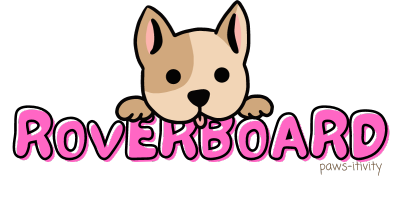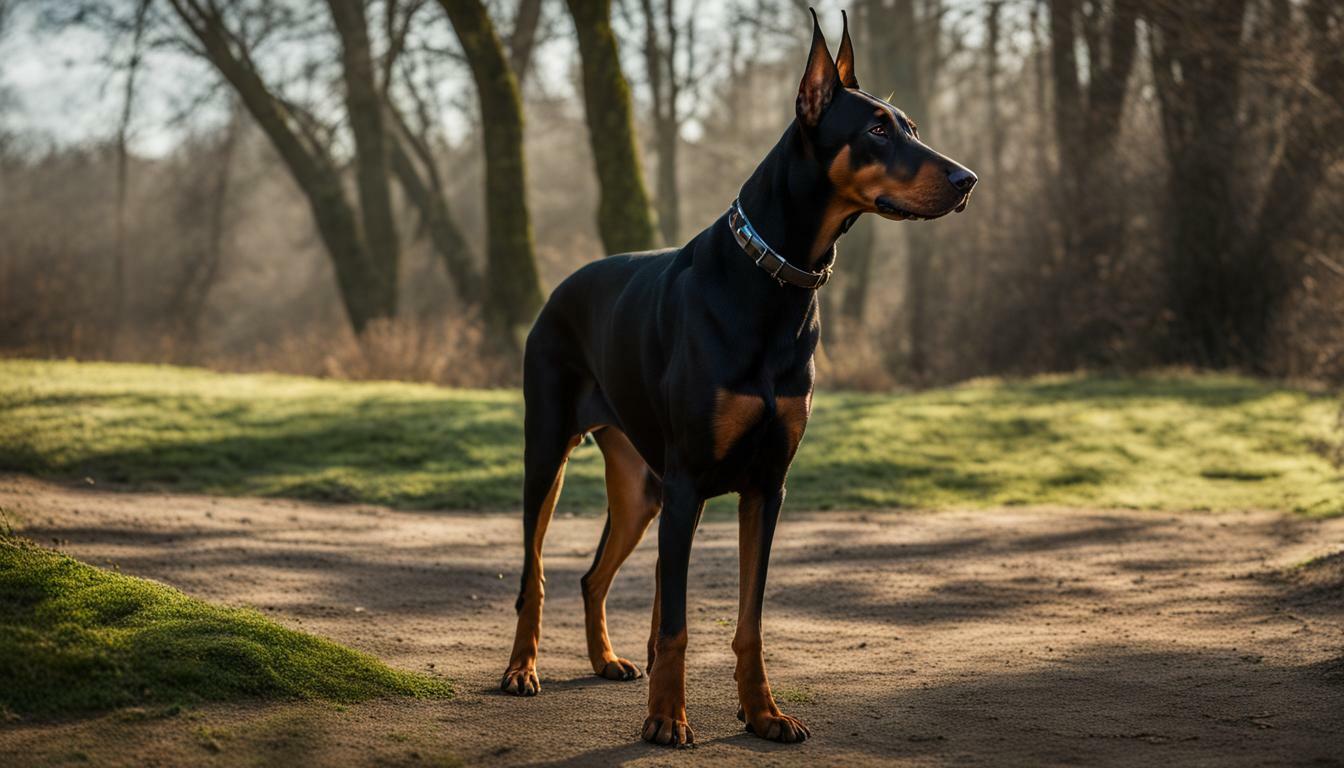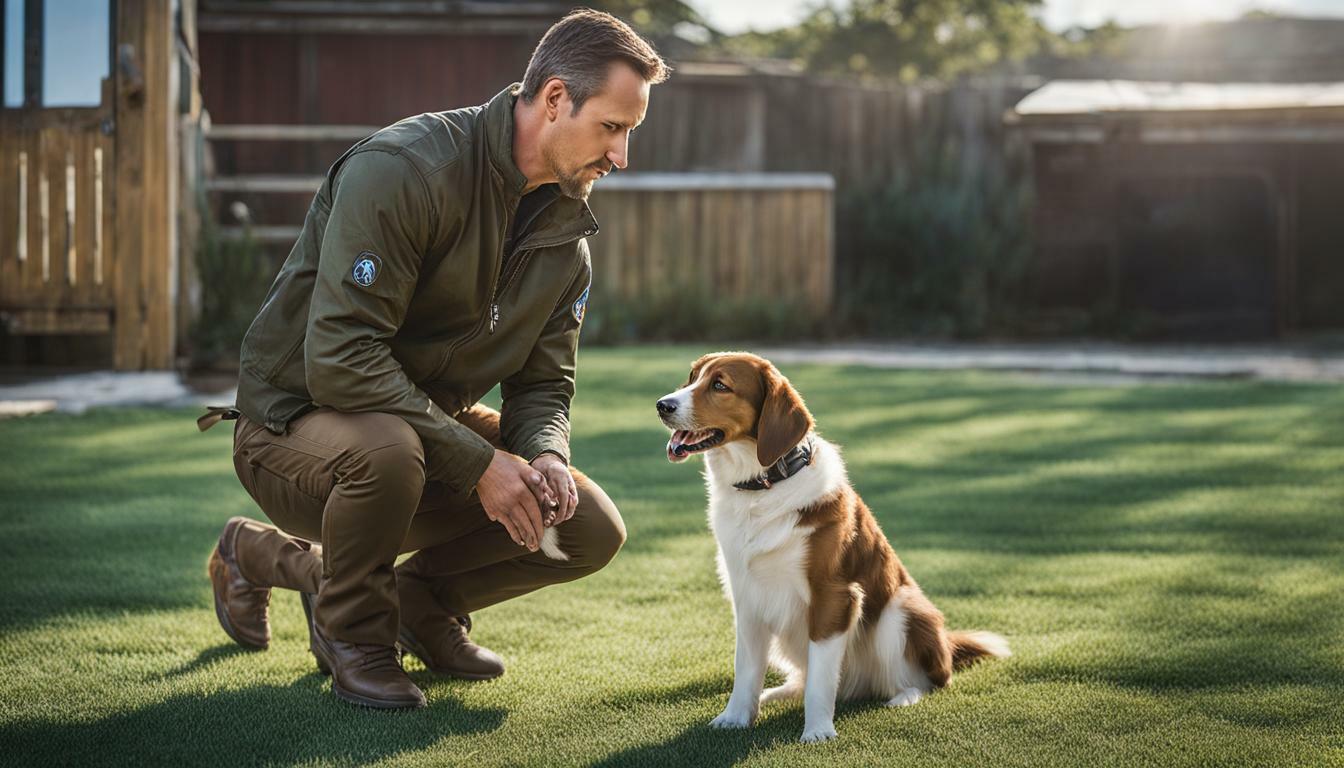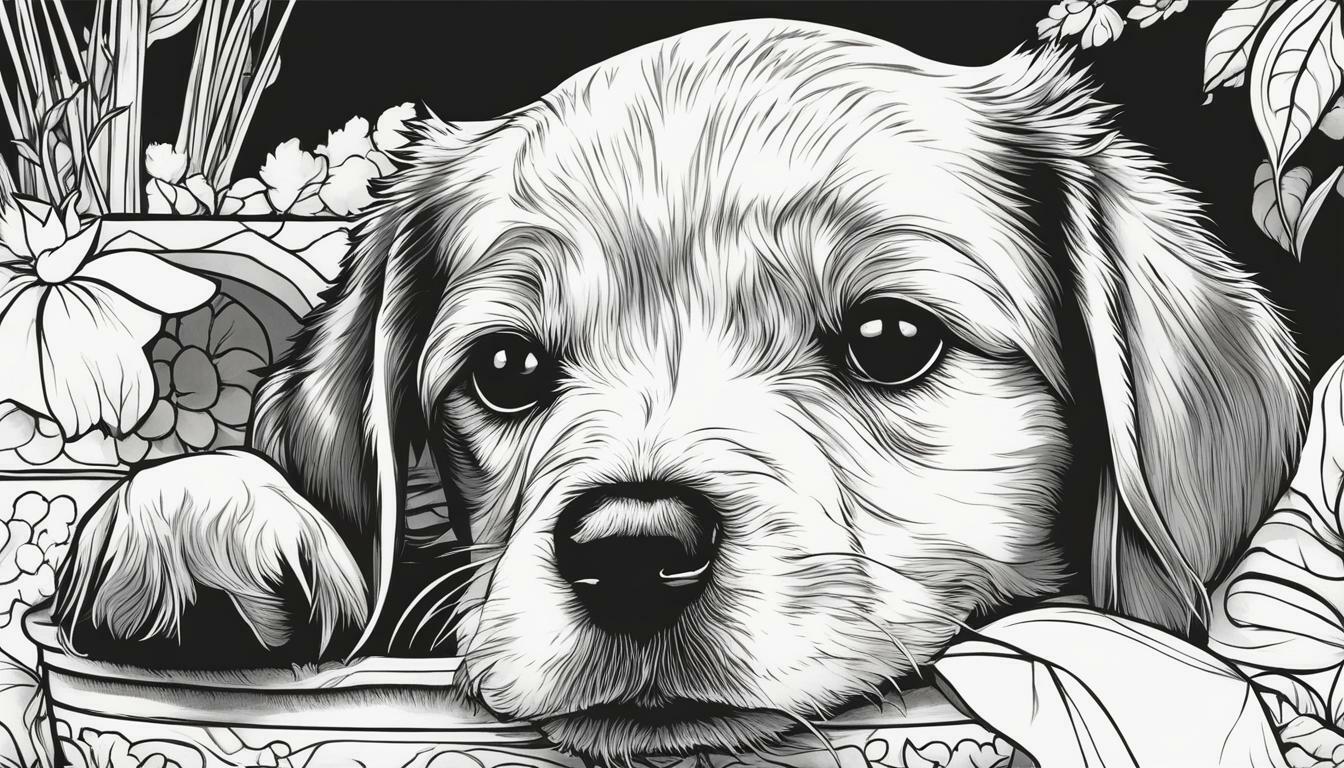If you’re considering adding a Doberman Pinscher to your family, it’s important to understand their unique needs and characteristics. This comprehensive Doberman Pinscher ownership guide will provide you with all the information you need to know about caring for and training this loyal breed.
From choosing the right Doberman Pinscher for your lifestyle to understanding their health needs, exercise requirements, temperament, grooming tips, and the importance of socialization, this guide will help you become a pro in handling these magnificent dogs.
- Becoming a Doberman Pinscher owner requires dedication, patience, and love.
- Choosing the right Doberman Pinscher is crucial for a successful ownership experience.
- Understanding the breed’s unique temperament is essential for training and behavior management.
- Proper health care, exercise, grooming, and socialization are essential for a happy and healthy Doberman Pinscher.
- Training using positive reinforcement methods is the most effective way to ensure good behavior and build a strong bond with your Doberman Pinscher.
Choosing the Right Doberman Pinscher
Before bringing a Doberman Pinscher into your home, it’s essential to select the right one that matches your lifestyle. There are various factors to consider when it comes to choosing the perfect Doberman Pinscher that suits your needs.
Breed Standards
Doberman Pinschers have specific breed standards that reputable breeders follow. Studying these standards can help you identify whether a breeder is breeding high-quality dogs that follow the breed’s standards.
According to the American Kennel Club (AKC), Doberman Pinschers are a medium-sized breed that can weigh between 60 and 100 pounds. They have a short, sleek coat that can come in four colors – black, red, blue, and fawn.
When breeders adhere to the standards, you can expect to get dogs that exhibit the breed’s characteristics, including loyalty, intelligence, and protectiveness.
Reputable Breeders
It’s crucial to get your Doberman Pinscher from a reputable breeder to ensure the dog’s health, personality, and breed standards. Reputable breeders prioritize their dogs’ welfare and their health over profit.
Ensure the breeder is registered with the AKC and its local breeder club. Conduct research and ask for recommendations from your veterinarian or other pet owners to avoid falling into the hands of backyard breeders or puppy mills.
Assessing Health and Temperament
When selecting your Doberman Pinscher, it’s crucial to assess their health and temperament. This is why it’s essential to meet the pup’s parents and observe their behavior to understand their potential temperament and health issues.
If you’re adopting a rescue dog, you can ask for their behavior and medical history to understand their disposition and whether they have any health issues.
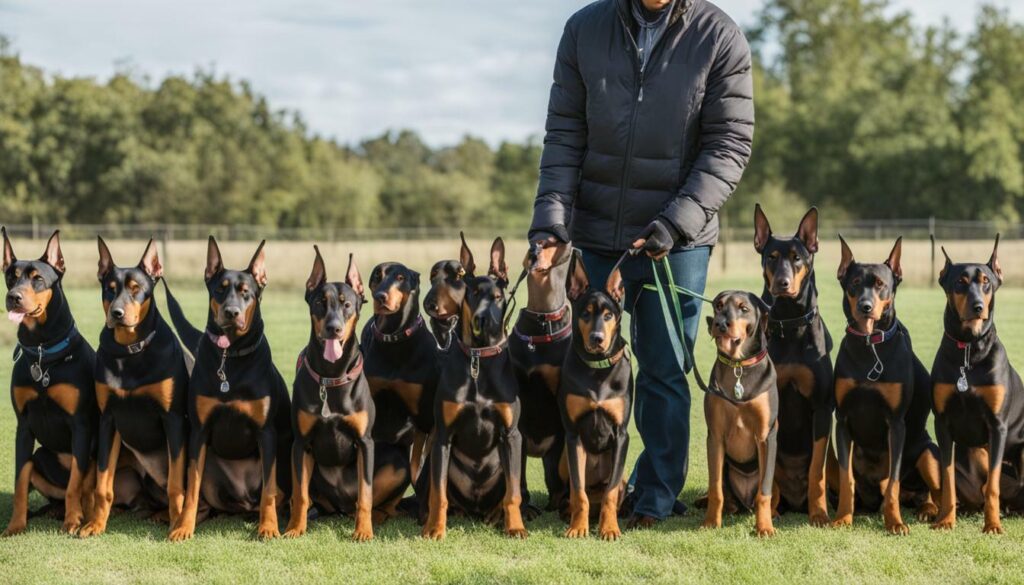
Choosing the right Doberman Pinscher is crucial to their happiness and well-being. By understanding breed standards, finding reputable breeders, and assessing their health and temperament, you can make informed decisions that lead to a lifetime of happiness with your furry friend.
Understanding the Doberman Pinscher Temperament
The Doberman Pinscher is a breed known for its unique temperament, which sets it apart from other breeds. Understanding their temperament and characteristics can help you better train and care for your new furry friend.
Intelligence is one of the most prominent characteristics of Doberman Pinschers. They are quick learners and highly trainable, making them a popular choice for service and protection work.
Their loyalty and protectiveness are also key traits. Dobermans are fiercely loyal to their owners and can be very protective of their families and territory.
However, these traits can also present challenges in training. Dobermans can become overprotective and territorial if not socialized properly at an early age. It is important to train them with positive reinforcement and expose them to various environments, people, and animals to prevent aggressive behavior.
Overall, the Doberman Pinscher is a highly intelligent, loyal, and protective breed. Proper training and socialization can help ensure they are well-behaved and happy companions.
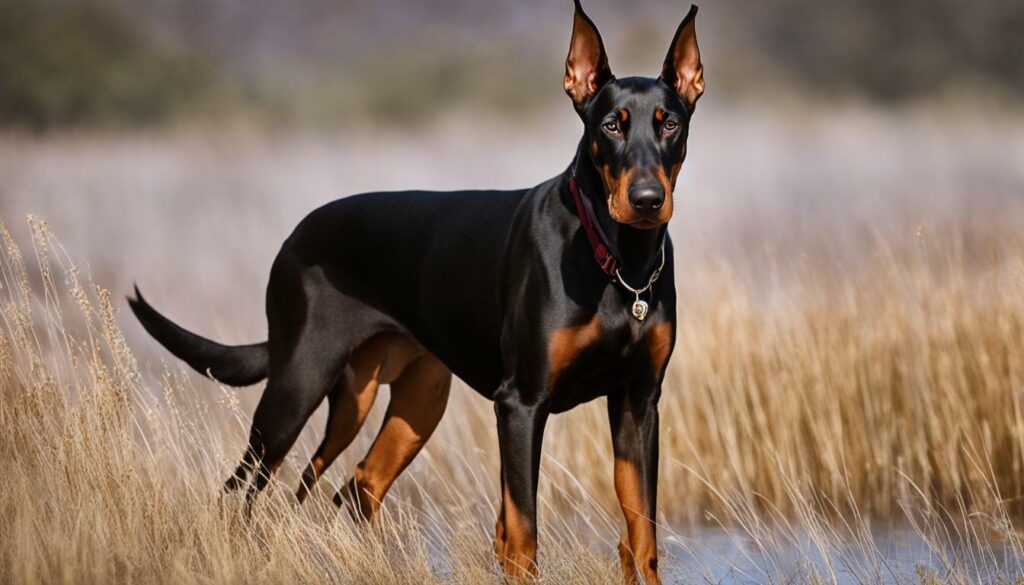
A healthy Doberman Pinscher is a happy Doberman Pinscher. It’s crucial to ensure your furry friend’s health to keep them active and happy for years to come. Let’s take a closer look at the common health issues that affect this breed and how to prevent them.
Common Health Issues
Doberman Pinschers are generally healthy dogs, but like any other breed, they are susceptible to certain health conditions. Some of the most common health issues that affect Doberman Pinschers include:
- Dilated cardiomyopathy (DCM)
- Von Willebrand’s disease (VWD)
- Hip dysplasia
- Hypothyroidism
- Progressive retinal atrophy (PRA)
It’s important to understand and recognize the symptoms of these conditions, as early detection can improve your pet’s chances of recovery.
Prevention and Treatment
Prevention is key when it comes to your Doberman Pinscher’s health. Here are a few tips to keep them in top condition:
- Feed them a balanced and nutritious diet specifically formulated for their breed and age.
- Ensure they receive proper exercise and activity to maintain a healthy weight and strong muscles.
- Take them for regular check-ups with a veterinarian who is familiar with the breed’s health issues.
- Keep up with their vaccinations and routine preventative treatments for parasites and ticks.
If your Doberman Pinscher does develop a health issue, prompt treatment is essential. Work with your veterinarian to develop a treatment plan that works for your pet’s specific condition.
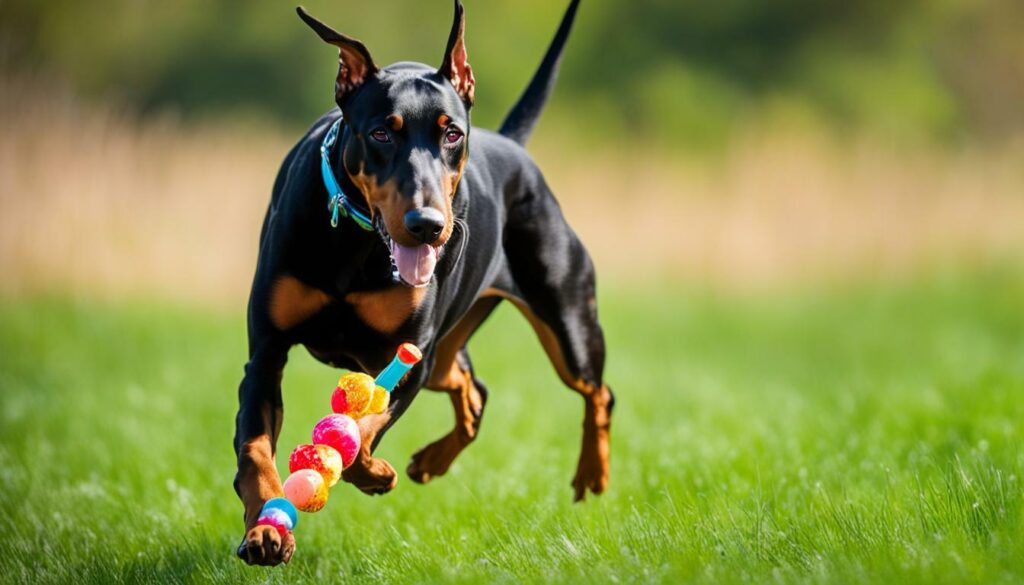
By following these tips, you can help keep your Doberman Pinscher healthy and happy for years to come.
Meeting Your Doberman Pinscher’s Exercise Needs
Doberman Pinschers are an active breed and require daily exercise to stay mentally and physically fit. A lack of exercise can lead to boredom, destructive behavior, and obesity.
It is recommended that Doberman Pinschers get at least 1-2 hours of exercise every day, which can include walks, runs, or interactive games.
When it comes to exercise, consider your Doberman Pinscher’s age, health, and individual needs. Puppies and older dogs may require less intense exercise, while younger dogs may benefit from more rigorous activities.
Make sure to provide plenty of mental stimulation as well, such as puzzle toys or obedience training, in addition to physical exercise.
Remember to always consult with your veterinarian before starting or changing your dog’s exercise routine to ensure it is safe and appropriate.
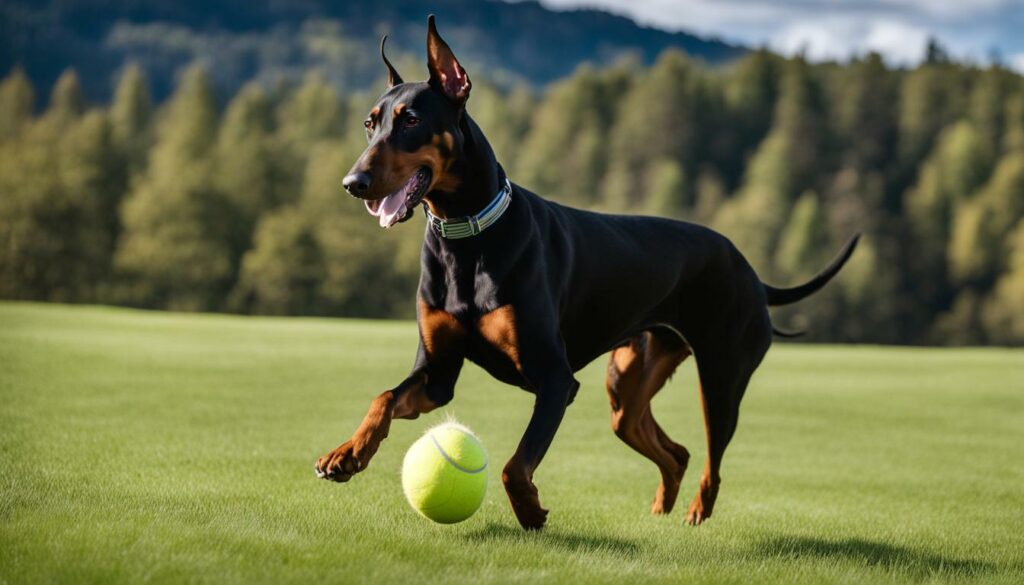
Grooming is an important aspect of Doberman Pinscher care that helps maintain their health and appearance. Follow these grooming tips to keep your Doberman Pinscher looking and feeling great.
Brushing Your Doberman Pinscher’s Coat
Doberman Pinschers have short, smooth coats that require minimal grooming. However, they still shed moderately and need regular brushing to remove loose hair and prevent matting. Use a soft-bristled brush or grooming glove to brush your Doberman weekly, focusing on the areas that tend to mat, such as behind the ears, under the legs, and around the neck.
Trimming Your Doberman’s Nails
Trimming your Doberman’s nails is crucial to prevent discomfort, injury, and infection. Use a sharp, guillotine-style nail clipper to trim the tips of your dog’s nails, taking care not to cut too close to the quick. If you’re unsure about how to trim their nails, ask your veterinarian or a professional groomer for help.
Cleaning Your Doberman’s Ears
Doberman Pinschers have floppy ears that can trap dirt, debris, and moisture, leading to infections. To prevent this, check your dog’s ears weekly for redness, swelling, or a foul odor. Use a soft cloth or cotton ball dampened with an ear cleaning solution to wipe the inside of their ears. Avoid using cotton swabs, which can push debris further down into the ear canal and cause damage.
Maintaining Your Doberman’s Dental Hygiene
Good dental hygiene is crucial for your Doberman’s overall health. Brush their teeth daily with a soft-bristled brush and toothpaste formulated for dogs. If your dog won’t allow you to brush their teeth or has signs of dental disease, consult your veterinarian for other options, such as dental chews, toys, or a professional cleaning.
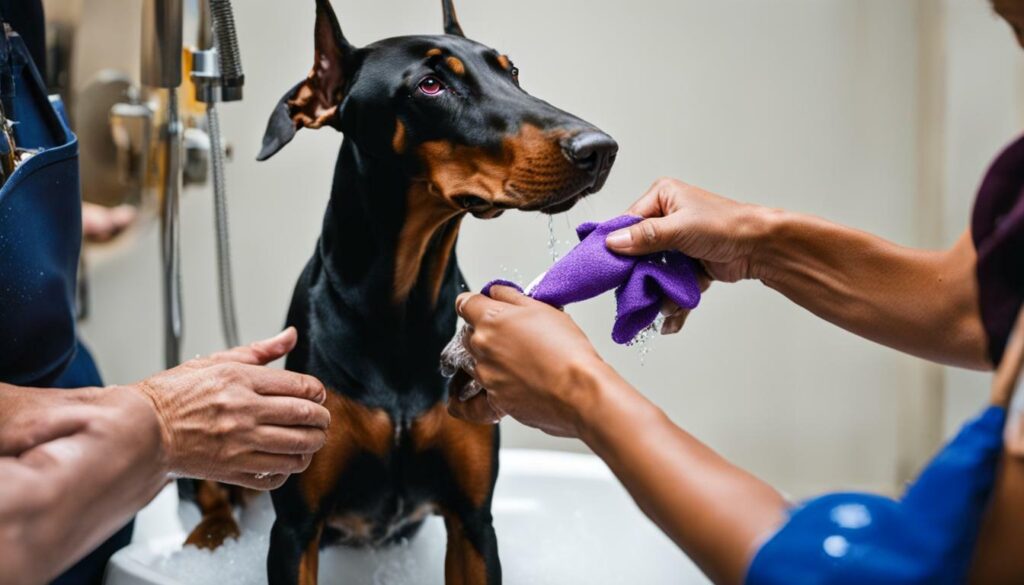
Doberman Pinschers have a naturally clean and odorless coat that requires infrequent bathing. Unless your dog gets into something particularly dirty or smelly, bathe them only once every few months using a dog-specific shampoo. Over-bathing can strip their coat of natural oils and lead to dry, itchy skin.
By following these simple grooming tips, you can keep your Doberman Pinscher looking and feeling their best.
The Importance of Doberman Pinscher Socialization
Socialization is a crucial aspect of Doberman Pinscher care and should begin early in a puppy’s life. It involves introducing your dog to a variety of environments, people, and animals to help them develop confidence and good behavior, and prevent aggression towards strangers or other dogs.
The critical period for socialization is between 3 and 16 weeks of age, during which puppies are more open to new experiences and less fearful. However, it’s never too late to socialize your Doberman Pinscher, and adult dogs can also benefit from exposure to new situations.
Proper socialization can help your Doberman Pinscher become a well-rounded, obedient companion. It can also prevent behavior problems such as fear aggression or separation anxiety.
How to Properly Socialize Your Doberman Pinscher
When socializing your Doberman Pinscher, it’s essential to do so in a positive and controlled manner. Here are some tips to help you start:
| Tip | Description |
|---|---|
| Start Slow | Begin with small, controlled introductions to new people and animals in a safe environment. Gradually increase the level of stimulus as your dog becomes more comfortable. |
| Reward Good Behavior | Use positive reinforcement techniques such as treats, praise, and toys to reward your dog for good behavior during socialization. |
| Be Observant | Pay attention to your dog’s body language during socialization and intervene if they become overly fearful or aggressive. |
| Expose to Different Environments | Introduce your Doberman Pinscher to different environments such as parks, beaches, and busy streets to help them become accustomed to various sights, sounds, and smells. |
| Allow Interaction with Other Dogs | Controlled interactions with other dogs can help your Doberman Pinscher learn appropriate social skills and play behaviors. |
Remember that socialization is an ongoing process and should be continued throughout your Doberman Pinscher’s life. Regular exposure to new experiences can help them maintain their social skills and prevent regression.
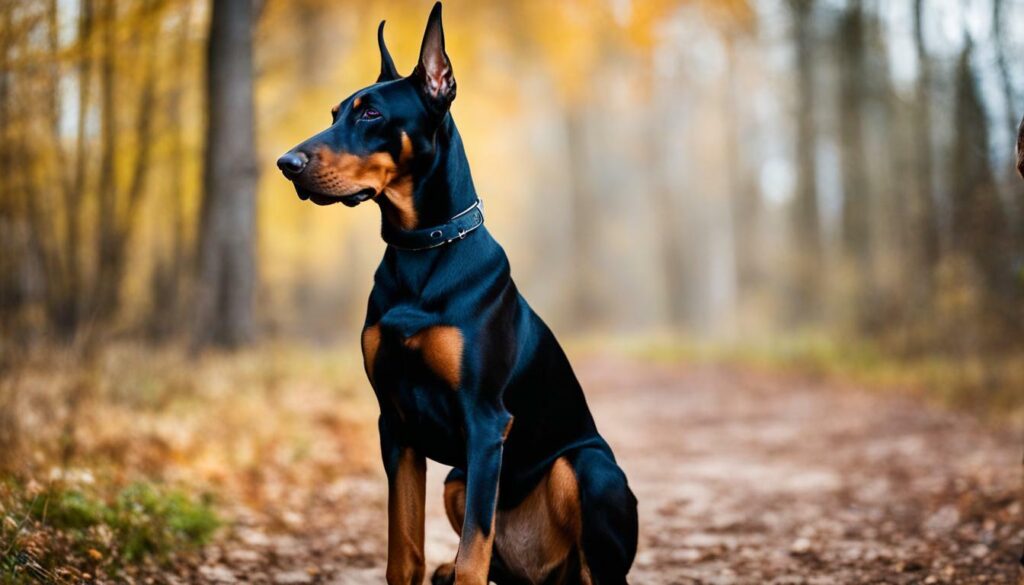
Training your Doberman Pinscher is essential for a well-behaved and obedient dog. It is crucial to establish leadership and a strong bond with your Doberman Pinscher during the training process. Here are some Doberman training advice to help you train your pup:
Start Early
Start training your Doberman Pinscher as early as possible. The earlier you begin training, the easier it will be to mold their behavior. Puppies are more receptive to learning new things, and starting early will help them develop good habits that will last a lifetime.
Positive Reinforcement
Use positive reinforcement techniques such as treats, toys, and verbal praise. Positive reinforcement is an effective training method that rewards good behavior, encourages learning, and builds trust between owner and dog.
Be Consistent
Consistency is key to successful Doberman training. Use the same commands and techniques every time to ensure your Doberman Pinscher understands what is expected of them. Consistency will also help your Doberman Pinscher learn faster and retain what they have learned.
Avoid Physical Punishment
Avoid using physical punishment during training. Doberman Pinschers are a sensitive breed, and physical punishment can cause fear and mistrust, leading to behavior problems. Instead, use positive reinforcement techniques to encourage good behavior.
Exercise Regularly
Regular exercise is essential for a well-trained Doberman Pinscher. Exercise not only helps keep your dog physically fit but also helps release pent-up energy and stress, which can lead to behavior problems. Make sure to incorporate physical activity into your Doberman Pinscher’s daily routine.
Address Behavior Problems Immediately
If you notice any behavior problems during training, address them immediately. Ignoring behavior problems can make them worse and harder to correct. Seek the help of a professional trainer if necessary.
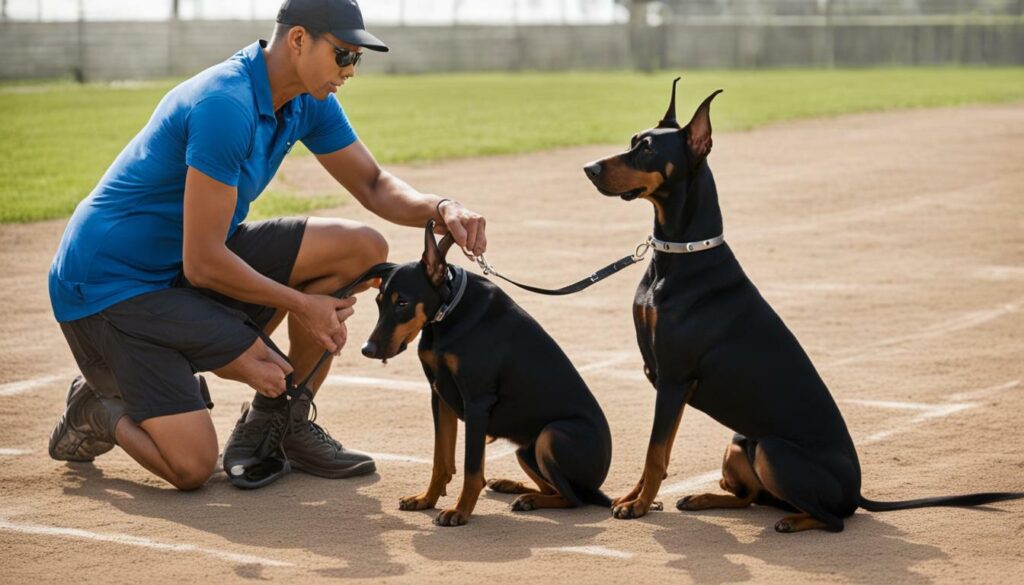
By following these Doberman training advice, you can create a strong bond with your dog and ensure they become a well-behaved member of your family.
Doberman Pinscher Breed Information
The Doberman Pinscher, also known as simply Doberman, is a medium to large-sized breed originating from Germany. They were bred in the late 19th century to be guard dogs, and served in the military and police forces. Today, they are popular companions and working dogs, known for their intelligence, loyalty, and protective nature.
Doberman Pinschers have a short, sleek coat that can come in a variety of colors, including black, blue, red, and fawn. They have a muscular build and an elegant appearance.
According to the American Kennel Club (AKC), the breed typically weighs between 60 to 100 pounds and stands 24 to 28 inches tall at the shoulder. Their life expectancy is around 10 to 13 years.
Characteristics
Doberman Pinschers are known for their sharp intelligence, trainability, and loyalty to their family. They have a strong prey drive and are naturally protective, making them excellent guard dogs. However, it’s important to properly socialize and train them to avoid any aggressive behavior towards strangers.
They are energetic dogs that require regular exercise and mental stimulation. They are also affectionate and thrive on human companionship.
Breed-Specific Traits
Doberman Pinschers are prone to certain health problems, including hip dysplasia, von Willebrand’s disease, and cardiomyopathy. It’s important to get regular check-ups with a veterinarian to ensure their health.
The breed is also known for its ear cropping and tail docking traditions. While ear cropping is less common nowadays, tail docking is still practiced in some countries.
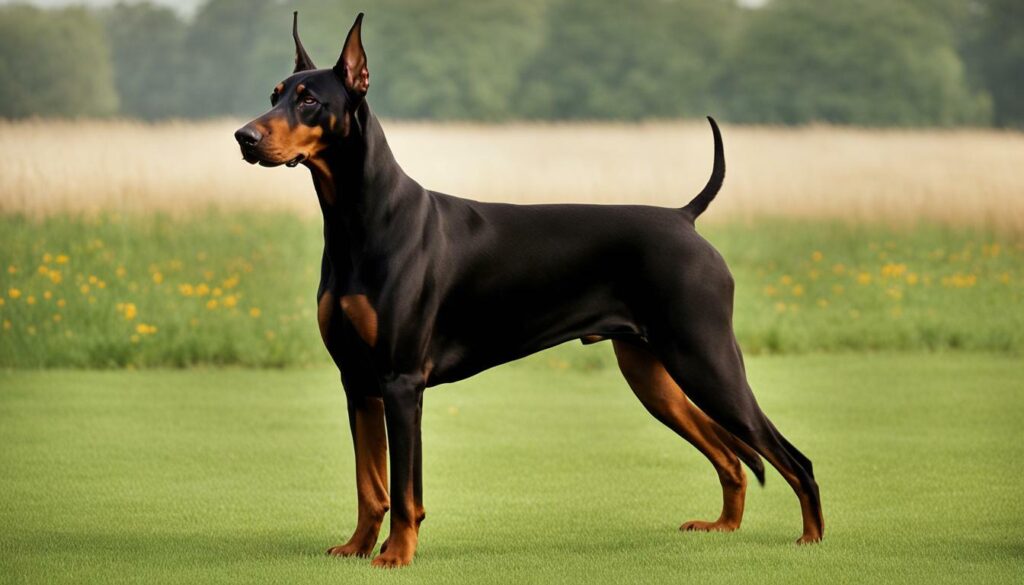
| Group | Working |
|---|---|
| Height | 24-28 inches (male); 22-26 inches (female) |
| Weight | 60-100 pounds (male); 50-70 pounds (female) |
| Coat | Short, sleek, and close-fitting |
| Color | Black, blue, red, fawn, and their dilutions |
When choosing a Doberman Pinscher, it’s important to look for a reputable breeder who follows breed standards. This ensures that the dog is healthy, well-socialized, and conforms to the breed’s physical and behavioral traits.
Doberman Pinscher Care Tips
While caring for your Doberman Pinscher may seem overwhelming at first, following a few simple tips can help keep your dog happy and healthy. Here are some Doberman Pinscher care tips to keep in mind:
Feeding Guidelines
Providing a balanced diet is crucial to your Doberman Pinscher’s overall health. Choose a high-quality dog food that meets their nutritional needs and doesn’t contain harmful fillers or by-products. Depending on your dog’s age, activity level, and size, you may need to adjust their food intake and feeding schedule accordingly. Consult with your veterinarian for personalized feeding guidelines.
Safety First
Creating a safe environment for your Doberman Pinscher is important. Keep hazardous substances out of reach and secure your home to prevent your dog from escaping or getting into trouble. Be sure to supervise your dog around small children and other pets and use caution when introducing them to new environments.
Grooming
Grooming not only keeps your Doberman Pinscher looking their best but also helps maintain their health. Brush their coat regularly, trim their nails, clean their ears, and regularly check for any signs of skin irritation or fleas. Daily brushing also helps reduce shedding.
Establish a Routine
Establishing a routine can help keep your Doberman Pinscher happy and well-behaved. Set a regular feeding and exercise schedule and stick to it. Provide plenty of toys and playtime to keep them mentally stimulated. Incorporating training into your routine can also help improve your dog’s behavior and strengthen your bond.
Regular Check-Ups
Regular veterinary check-ups are essential for maintaining your Doberman Pinscher’s health. Bring your dog in for routine exams, vaccinations, and preventative care. Early detection of health issues can be critical for successfully treating them.
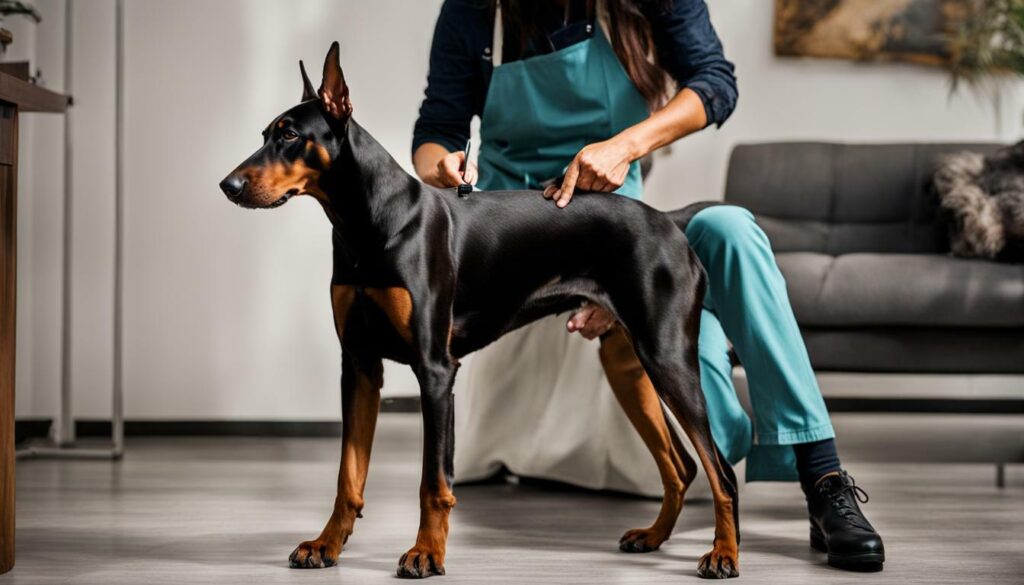
Following these Doberman Pinscher care tips can help keep your dog healthy and happy for years to come. Remember that each dog is unique, and consulting with your veterinarian can provide the best care for your individual pet. With dedication and love, you can provide the best care for your beloved Doberman Pinscher.
Conclusion
Caring for a Doberman Pinscher is both a rewarding and challenging experience. By following this comprehensive guide, you now have the tools and knowledge necessary to provide the best care for your furry friend. Remember, choosing the right Doberman Pinscher for your lifestyle, understanding their temperament, and providing proper health care, exercise, grooming, and socialization are key to raising a happy, healthy, and well-behaved dog.
Always Seek Professional Advice
It’s important to keep in mind that every Doberman Pinscher is unique, and some may require different care than others. If you have any concerns or questions about your dog’s health or behavior, always seek advice from a professional veterinarian or dog trainer. They can provide tailored tips and recommendations that can help you address any issues that may arise.
With dedication, patience, and love, you can develop a strong bond with your Doberman Pinscher and provide them with a fulfilling and joyous life. Enjoy your journey as a Doberman Pinscher owner, and remember to cherish every moment with your furry friend!
FAQ
Q: What factors should I consider when choosing a Doberman Pinscher?
A: When choosing a Doberman Pinscher, consider breed standards, reputable breeders, and assess the dog’s temperament and health.
Q: What should I know about the Doberman Pinscher’s temperament?
A: The Doberman Pinscher is known for its intelligence, loyalty, protectiveness, and potential challenges in training.
Q: How can I ensure my Doberman Pinscher’s health?
A: To ensure your Doberman Pinscher’s health, be aware of common health issues, prevent them, and provide regular veterinary check-ups and vaccinations.
Q: What are the exercise needs of a Doberman Pinscher?
A: Doberman Pinschers require regular exercise, including daily walks, playtime, and engaging activities to keep them mentally and physically stimulated.
Q: What grooming tips should I follow for my Doberman Pinscher?
A: Proper grooming includes brushing their coat, trimming nails, cleaning ears, and maintaining dental hygiene.
Q: Why is socialization important for Doberman Pinschers?
A: Socialization is crucial for their development, helping them adapt to new environments, people, and animals, while improving their behavior and confidence.
Q: Do you have any training advice for Doberman Pinschers?
A: Effective training techniques, positive reinforcement methods, and solutions to common behavior issues specific to the breed are essential for successfully training your Doberman Pinscher.
Q: Where can I find more information about the Doberman Pinscher breed?
A: Dive into the breed’s rich history, unique characteristics, appearance, size, life expectancy, and any breed-specific traits through reliable sources and breed organizations.
Q: What additional care tips should I follow for my Doberman Pinscher?
A: This section provides guidelines for feeding, creating a safe environment, and establishing a routine that promotes your Doberman Pinscher’s overall well-being.
Q: How can this Doberman Pinscher ownership guide help me?
A: By following this comprehensive guide, you will gain knowledge and confidence to provide the best care for your Doberman Pinscher, promoting a happy and well-behaved dog.
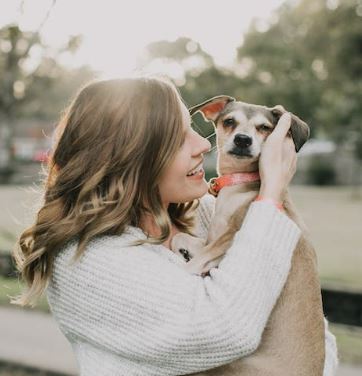
Marissa Delotta, 36, from Dayton, Ohio, is the creative force behind Roverboard.com, a beloved online destination for dog lovers. As a dedicated mom and canine enthusiast, Marissa combines her family experiences with her love for dogs to offer a platform where dog owners can exchange tips, heartwarming stories, and advice. Her website has become a vibrant community for sharing the joys of dog parenting. In her free time, Marissa enjoys exploring dog parks with her family and volunteering at local animal shelters.
